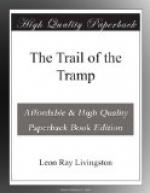Except for the rare instances, when the railroad company transferred their father to take charge of some other section, or the few times when they had made trips to the nearest villages, which were small and had but few inhabitants, the McDonald boys had never seen another world except the one whose boundaries melted into the endless, undulating prairie around their home.
Their parents, who were ever worrying about how to properly provide for their family, had—as nowadays so many other parents do—entirely overlooked the fact that growing boys should be permitted to travel, even if only upon an excursion, to curb within them the inborn and almost irresistible desire to roam, which all have inherited from ancestors, who attired in wooden shoes and coarse apparel, and carrying gunny sacks, had landed not so many years ago at Castle Garden, after having crossed the stormy Atlantic in the steerage of a sailing vessel, and who instead of bringing along a fancy “family tree”, had brought with them a pair of calloused, but willing hands, intending to win with them a way to wealth and fame, in the New World, for their own humble selves and their “proud” descendants.
The “Call of the City” found in the twins willing listeners as the cessation of their school duties, the enforced idleness at the reservation, and the monotony of their existence became a bane to them. They hearkened to the call that had already conquered a vast army of other boys, sons of those who till the soil and labor out-of-doors earning a fair competence, which although it demands hard toil, gives in exchange pure air, healthy food and every comfort and luxury that willing hands backed by intelligence can produce.
For months prior to their departure on their trip, whenever they could gallop beyond ear shot of their elder brother, while riding to and from school, and at night when alone in their bedroom, Joe and Jim pictured to each other the grand future which they thought every city offered to them, comparing it favorably with the drudge of the life of monotonous toil that would be theirs at the section reservation. They repeated the stories of success they had read in the newspapers, the magazines and even in their school books, which told in glowing words of poor lads who had forsaken the country to become rich and famous in the cities, but they never repeated, for they had never read the stories of those unaccountable numbers who had “moved to town” and who had been swallowed up by the city’s whirlpool, to become slaves of the mills and the factories, serfs of the bars and the counters, and who had been forced to toil from dawn to dusk to barely eke out an existence that meant residing high up in the simmering, sweltering tenements, or in damp, pest-ridden basements, deep down in the bowels of the earth, which coupled with improper food, quickly reduced their vitality, so that although they were young in years, the merciless lash of the city’s fight for a living had bent their backs and prematurely aged them.




